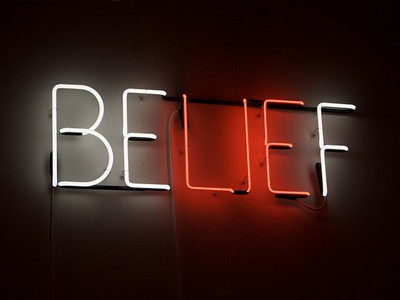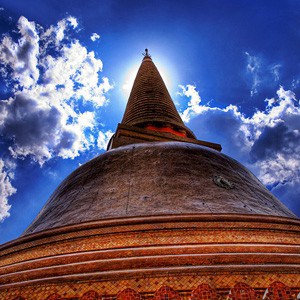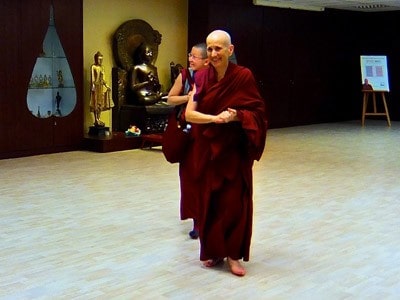Beliefs turned on their head
By G. S.

G. S. describes his struggles in dealing with the self-centered mind and the importance of not giving up that struggle.
I find that so many of the views we have are a direct result of the culture we live in. I grew up in a very conservative, Roman Catholic, white world dominated by strong men, which formed many of my views today. As my Buddhist practice deepens and I take a more honest look at my views regarding others, society, women, race, other countries, etc., many of these views have been turned on their head. I have to let go of many views and opinions.
We—all of us—are suffering to one degree or another. We are caught in this ocean of samsaric suffering. We are completely caught up validating what we perceive as a self that, in reality, just doesn’t exist. I see it in here all the time first hand, although I’m sure that it’s the same out there. Men seek validation from their peers, constantly caught up in the eight worldly concerns, with the ego trying to prove its perceived existence. “I am this, therefore, I belong to this group.” “I believe this, therefore I belong with this group.” “We are this and they are not.” I find myself in constant battle with this polarizing, dualistic mindset as I peel away the labels and beliefs with which I define myself. These labels and beliefs are very hard to remove, and it’s even harder to remove the ones that apply to myself than to let go of the ones I put on other things. Clinging to our identities and beliefs as we see them is sad. So much suffering is caused from these two.
I find that our own expectation of others is part of our suffering. We have instilled and ingrained in our minds certain expectations, realistic or not, of people, places, and events, and then when these people, places, and events don’t live up to our expectations, we blame them for not being what we thought they were. Of course, usually no one knows about our expectations, but that doesn’t matter, we expect them to fulfill our expectations anyway. How insanely cruel we are, not only to these people, places, and things, but also to ourselves. Of course, these expectations are fully based or entrenched in our own fears, ignorance, and the constant pushing and pulling of cyclic existence, of this samsaric condition.
But, even knowing this, sadly, I find in my own reflections that I continue to do what I know I shouldn’t. Oh, what a sorry practitioner you must find me. I try and try and try, and yet I find that usually I can’t hit the side of the barn, let alone the target as a Mahayana practitioner.
While I once could care less about anything other than my own wants and needs, now I want to be loving and compassionate towards all being. Yet I still find the presence of “me” and “my universe” rearing its ugly head. I curse too much. I’m lazy in my practice and study. I take for granted that I will live tomorrow. I still objectify women. And as much as I hate to admit it, deep down I find that even after all these years of practice, I still see the world of the American white male to be top dog on the block. I am in a constant inner battle against the doctrine that I’ve believed most of my life. Such things as sexism, racism, the questionable power of the USA, etc., were not negatives in my life and then POW! Along comes Buddhism and throws my entire belief system into question.
There can be no greater battle than the one that we wage within our selves—to face myself on my own, letting go of my traditional cultural beliefs, the crutches and vision blockers that I’ve used my entire life, to realize that I cannot point to another person, God, or thing as the source of my suffering. It is me who has set this karmic wheel into motion. The conditions I am presently experiencing are, in fact, a direct result of choices and actions my own conscious mental continuum set into motion years or even eons ago. I cannot prove this to anyone, although I know without a doubt that what I am today is a direct result of my own causative actions of an endless mental continuum of karmic seeds flowing down to this present day—this is the conditioned existence of samsara.
In the 1970s, there was a rock band, the J. Geils Band, that had a song called “Musta Got Lost.” One of the lines in this song says, “I must have got lost somewhere down the line.” This line of song represents how I feel about this thing I call “my life.” And so being the lost traveler that I am, I find that I am constantly searching through the dark forest of my mind, struggling through the thickets of bush, trees, tangles of vine, mud, rivers, and mountains, ever moving forward, my skin being pierced, thrashed and whipped by the branches and thistles of my beliefs and culture. At times, I wonder what’s the use, as I lay there exhausted, bloody and tired, dirty, sweaty and out of breath. But then something—call it that small still voice—tells me I must push on through. I must not, cannot, give up. I cannot tell you how or why I believe this small still voice to be true, or even where it comes from. What I do know is that for me it is the greatest form of truth that I know, so I continue trekking through this mental forest.
Incarcerated people
Many incarcerated people from all over the United States correspond with Venerable Thubten Chodron and monastics from Sravasti Abbey. They offer great insights into how they are applying the Dharma and striving to be of benefit to themselves and others in even the most difficult of situations.


